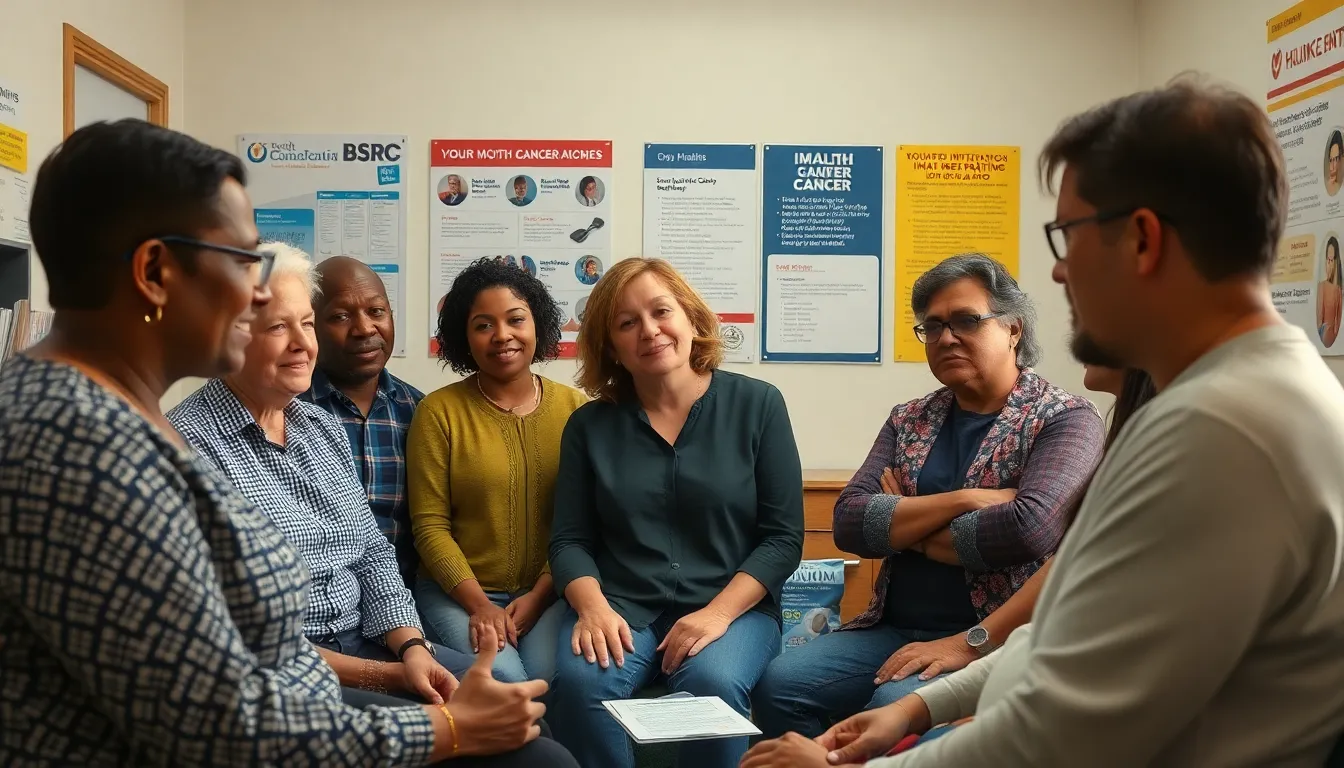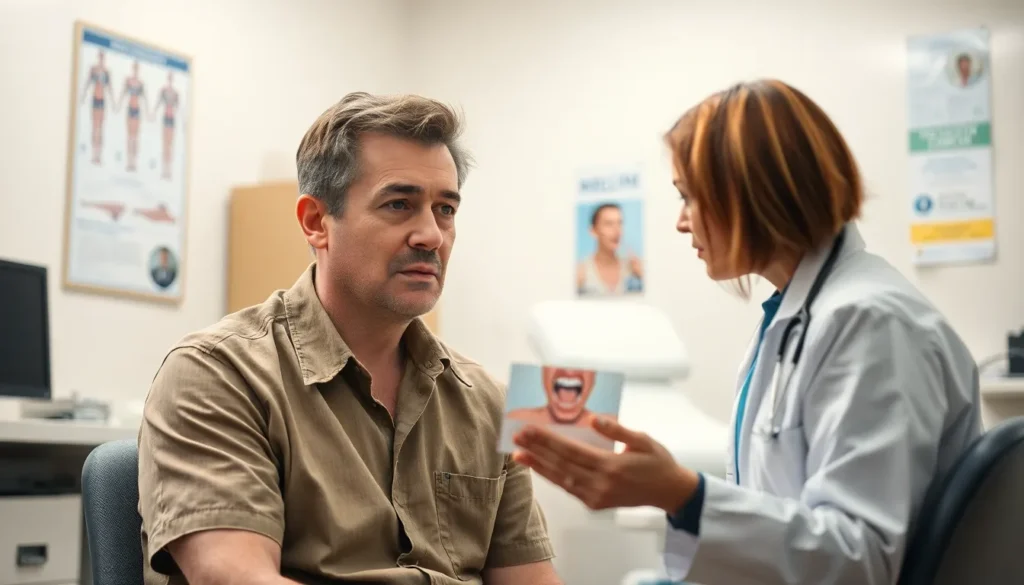Mouth cancer might not be the most popular topic at dinner parties, but it’s one that deserves attention. After all, no one wants to become a statistic in a horror story. While it’s easy to dismiss the seriousness of oral health, the truth is that mouth cancer can be a real threat. It’s not just a bad case of bad breath; it can have life-altering consequences.
So, can you die from mouth cancer? Spoiler alert: yes, you can. But don’t panic just yet! Understanding the risks and symptoms can be your best defense. By staying informed and taking proactive steps, it’s possible to keep this unwelcome guest at bay. Let’s dive into the details and uncover the facts you need to know to protect that dazzling smile.
Table of Contents
ToggleOverview of Mouth Cancer
Mouth cancer, also known as oral cavity cancer, affects various parts of the mouth including the lips, gums, tongue, and the lining of the cheeks. This type of cancer typically arises in the squamous cells that line the oral cavity. Individuals at higher risk include tobacco users, excessive alcohol consumers, and individuals with a history of human papillomavirus (HPV) infection.
Symptoms can differ significantly and may include persistent sores, lumps, or swollen areas in the mouth. Other signs often involve difficulty in swallowing or chewing and unexplained bleeding in the mouth. Early detection greatly improves the survival rate, with a five-year survival rate of about 66% for localized cases, according to the American Cancer Society.
Diagnosis often requires a physical examination coupled with a biopsy to confirm the presence of cancerous cells. Healthcare professionals may also use imaging tests like CT scans or MRI to determine cancer’s stage and extent. Treatment options range from surgery and radiation therapy to chemotherapy, depending on the cancer stage and overall health of the individual.
Proactive measures include regular dental check-ups and self-examinations for unusual oral changes. Maintaining a healthy lifestyle by avoiding tobacco and limiting alcohol consumption can significantly reduce the risk of developing mouth cancer. Awareness of symptoms and risk factors plays a pivotal role in early detection and treatment, ultimately affecting outcomes and survival rates.
Risk Factors for Mouth Cancer

Several significant factors increase the risk of developing mouth cancer. Understanding these risks can aid in prevention and early detection.
Tobacco Use
Tobacco use stands as a leading cause of mouth cancer. Smoking cigarettes or using smokeless tobacco products elevates the risk significantly. Those who use tobacco can face a tenfold increase in the likelihood of developing oral cavity cancers. Quitting tobacco can lower this risk substantially, even after years of use.
Alcohol Consumption
Excessive alcohol consumption poses another major risk. Individuals consuming more than three alcoholic drinks daily can face a heightened chance of mouth cancer. The combination of alcohol and tobacco greatly escalates these risks. Lowering or eliminating alcohol intake can contribute positively to oral health and reduce cancer development.
HPV Infection
Human papillomavirus (HPV) infection is linked to a growing number of mouth cancer cases. Certain strains of HPV, particularly HPV-16, have strong associations with oropharyngeal cancers. Young adults and individuals with multiple sexual partners often show higher susceptibility. Vaccines exist to prevent HPV-related infections, providing a proactive measure against this risk.
Symptoms and Diagnosis
Mouth cancer symptoms tend to present in various forms, often making early detection challenging.
Early Symptoms
Persistent sores in the mouth might signal trouble, often lasting more than two weeks without healing. Lumps or swellings could also appear on the gums, tongue, or any other part of the oral cavity. Difficulty swallowing arises when cancer progresses, making it hard to eat or drink. Unexplained bleeding in the mouth or unusual patches may also develop, indicating a need for medical evaluation. Changes in voice, such as hoarseness, can accompany these symptoms, and noticing any of these early signs warrants prompt attention.
Diagnostic Procedures
Diagnosis usually begins with a thorough physical examination by a healthcare professional. Biopsy procedures play a critical role in confirming the presence of cancerous cells. During this process, a small tissue sample is taken for laboratory analysis. Imaging tests like X-rays, CT scans, or MRIs provide vital information about the cancer stage and spread. Clinicians might also perform endoscopic examinations to visualize affected areas directly. These combined procedures contribute to establishing an accurate diagnosis and developing an effective treatment plan.
Treatment Options
Treatment options for mouth cancer include surgery, radiation therapy, and chemotherapy. Each method varies based on the cancer’s stage and location.
Surgery
Surgery aims to remove the tumor and surrounding tissue. This approach often involves partial or total removal of affected areas in the mouth, including the tongue, jaw, or lips. Surgeons may take further steps to reconstruct the mouth post-surgery, improving function and appearance. If cancer has spread to lymph nodes, those may also require removal. Surgery is usually recommended for localized cancers and can significantly increase survival rates.
Radiation Therapy
Radiation therapy uses high-energy rays to target cancer cells, shrinking tumors. Treatments often involve external beam radiation or brachytherapy, where radioactive sources are placed directly in or near the tumor. Sessions typically last several weeks, with daily treatments scheduled. This option can serve as a standalone treatment or complement surgery, especially in cases where surgical risks are high. Radiation may help alleviate symptoms in advanced stages, improving quality of life.
Chemotherapy
Chemotherapy employs anti-cancer drugs to eliminate cancer cells. This method may be administered orally or intravenously, influencing cancer throughout the body. Often used in conjunction with surgery or radiation therapy, it targets cancer that has spread beyond the oral cavity. Side effects can include nausea, fatigue, and hair loss, but advancements in medicine have improved the management of these symptoms. Chemotherapy decisions rely on the cancer’s type and stage, as well as the patient’s overall health.
Prognosis and Survival Rates
Prognosis for mouth cancer can vary significantly. Factors such as the cancer’s stage, location, and overall health of the individual play crucial roles.
Factors Influencing Survival
Survival is closely tied to early detection. Localized mouth cancer offers a five-year survival rate of about 66%. Treatment responses influence outcomes. Surgery, when performed on early-stage cancers, generally yields better survival rates. Additionally, the patient’s age can impact prognosis; younger individuals often respond more favorably to treatment. Lifestyle choices, including tobacco use and alcohol consumption, remain critical risk factors. Those who maintain healthy habits generally see improved survival prospects.
Can You Die From Mouth Cancer?
Mouth cancer can indeed be fatal, particularly if diagnosed in advanced stages. Late-stage cancers significantly decrease survival rates, with some patients facing dire outcomes. The potential for metastasis adds complexity to the prognosis, making regular monitoring vital. If symptoms persist without medical evaluation, the risk increases. Awareness of early signs can lead to timely interventions, improving chances for long-term survival. Understanding the severity of this cancer underscores the need for consistent self-examinations and professional check-ups.
Mouth cancer poses a significant threat to individuals’ health and well-being. Understanding the risks and recognizing early symptoms can make a substantial difference in outcomes. By taking proactive steps such as regular dental check-ups and being aware of lifestyle factors, individuals can reduce their risk and enhance their chances of early detection.
Awareness and education are key components in the fight against this disease. Those at risk should remain vigilant and seek medical advice if they notice any concerning changes in their oral health. Ultimately, staying informed empowers individuals to take control of their health and potentially save lives.





